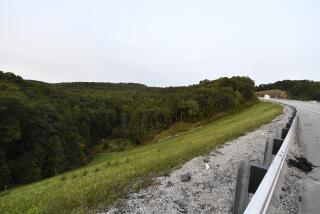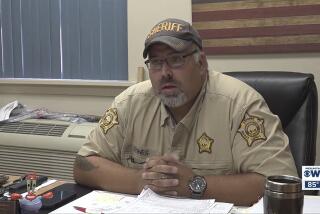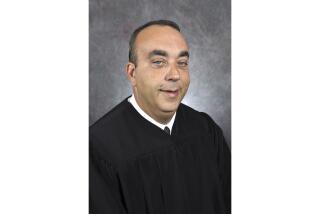Political Rival Arrested in Sheriff’s Slaying
- Share via
Two days after Pulaski County, Ky., Sheriff Sam Catron was killed by a long-distance rifle shot to the head, one of his campaign rivals and a worker for the rival campaign were arrested in connection with the crime.
The bizarre revelation was made all the more so by the memory of another crime, committed 44 years ago in the same town, Somerset: Catron was 4 and playing in his house when his father, the police chief, was shot and critically injured on the porch by an alleged bootlegger. Harold Catron would die of his wound seven years later.
Jeffrey Allan Morris, 34, who was challenging Sam Catron as he ran for his fifth term as sheriff, was being held late Monday on suspicion of complicity to commit murder. A man who worked on Morris’ campaign, Kenneth White, 54, was being held on the same charge. The alleged shooter, Danny Shelley, 30, was captured Saturday night after wrecking a low-slung, dark-purple motorcycle as he tried to escape. The motorcycle, police soon learned, was registered to Morris.
Under Kentucky law, all three could face the death penalty. They were being held without bond.
Morris came under suspicion within hours of the slaying Saturday night. He had in fact worked for Catron as a deputy for several years in the 1990s. Jim McWhorter, who was sworn in as sheriff following Catron’s death, said Monday he knew of no animosity between the two men and did not know why Morris had left the department.
“After several interviews with [Morris], we were able to determine that he, along with Mr. White, had knowledge of the crime and were complicit in it,” Kentucky State Trooper Craig Sutton said late Monday. “We feel like we have the three involved. We don’t expect any more arrests.”
On Saturday night, Catron, 48, was doing what most Kentucky county sheriffs do come election time: shaking hands, meeting his constituents, bidding on homemade cakes at the Somerset Volunteer Fire Department’s annual fish fry. He auctioned a couple off, bought another two for himself.
A sheriff known for leading from the front--personally piloting helicopters in his ongoing crusade against the area’s many marijuana growers, patrolling just like his deputies--Catron was wearing his uniform, but it was unclear whether he was technically on duty.
Determining that may be a key point if the cases come to trial. Prosecutors probably would argue any rural sheriff is on duty around the clock. In Kentucky, killing a police officer who is on duty is much likelier to lead to capital charges.
The husky, affable Catron, who first took office in 1985 and retained it with a coin toss after a tie with Kay Stringer in 1998, was facing Morris and several other candidates in a May 28 primary.
About 7:15 p.m., a cake in each hand, he headed out of the fire station and toward his patrol car, police say, apparently going home for the night. He had put one of the cakes on the top of his car when the shot rang out. Catron died immediately, the coroner said.
The shot, from a 25-06 hunting rifle, came from a nearby hill, “a considerable distance,” according to a preliminary report, where witnesses saw a man running, then climbing aboard a motorcycle and speeding west on Highway 80. As calls went out for police backup, one of Catron’s deputies and a volunteer firefighter gave chase, catching up with the motorcyclist after just a few miles.
The assassination could not help but remind old-timers and colleagues in the town of 11,000 of the day in 1957 when Catron’s father was shot. Harold Catron was on his porch when a black Buick slowly approached, according to court documents and the local paper, the Somerset Commonwealth Journal. The car slowed and an accused bootlegger named Robert Stephens, who for years had been feuding with the police chief, stuck the barrel of a 16-gauge shotgun out the window and fired.
Harold Catron was struck in the back by dozens of pellets. At least one remained lodged near his heart and was blamed for his death in 1964. Stephens shot and killed himself before trial.
Sam Catron was inside the house at the time. He first became a police officer in his early 20s. He always wore his protective vest.
More to Read
Sign up for Essential California
The most important California stories and recommendations in your inbox every morning.
You may occasionally receive promotional content from the Los Angeles Times.













